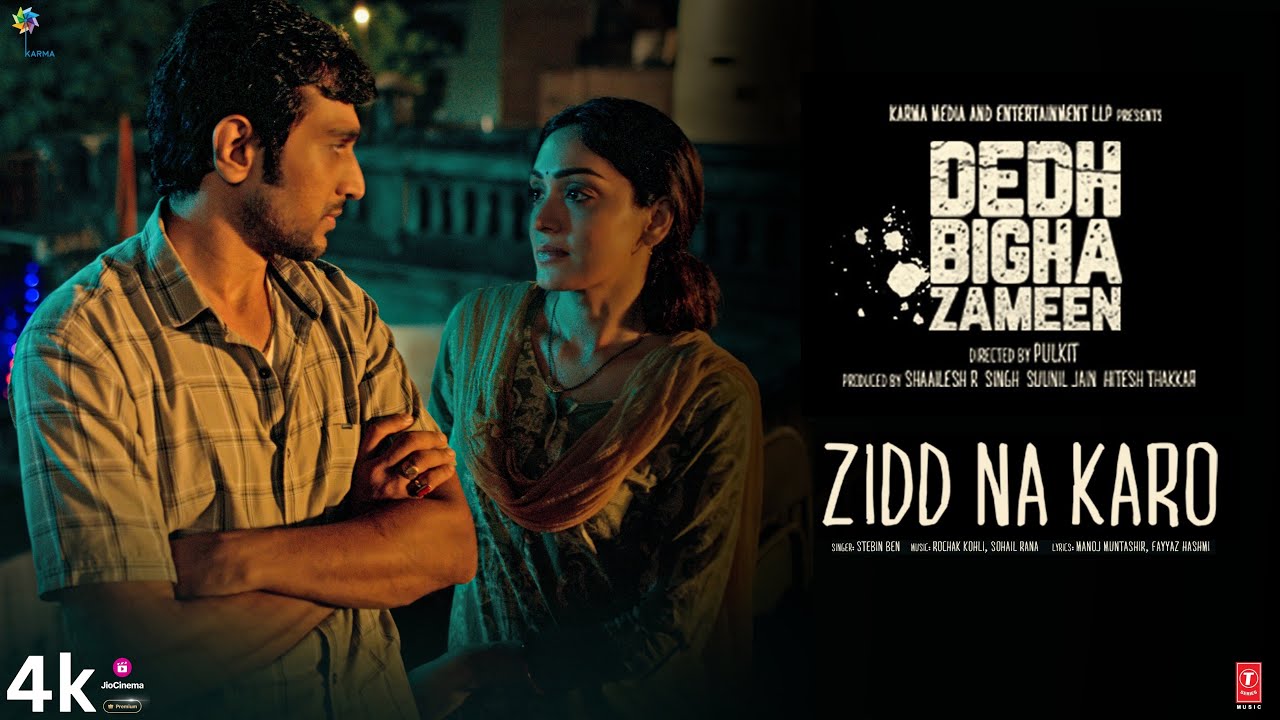Zidd Na Karo Lyrics Dedh Bigha Zameen
Discover the captivating movie “Dedh Bigha Zameen” and its soul-stirring song “Zidd Na Karo” by Farida Khanum. Immerse yourself in the enchanting melodies composed by Sohail Rana and the heartfelt lyrics penned by Fayyaz Hashmi.
“Zidd Na Karo Lyrics Dedh Bigha Zameen” Song Info
| Movie | Dedh Bigha Zameen |
| Song | Zidd Na Karo |
| Genres | Romantic |
| Singers | Farida Khanum |
| Music Directors | Sohail Rana |
| Lyricists | Fayyaz Hashmi |
| Song Starring | Pratik Gandhi, Khushalii |
| Music Label | T Series |
“Zidd Na Karo Lyrics Dedh Bigha Zameen”
Zidd Na Karo Lyrics In English
Bichade jo hum aaj iss pal yahan
Koi na jaane kaha phir mile
Chute jo hathon se ab haath to
Phir jaane kab do mushafir mile
Intezaah meri hud se guzar ayi hein
Rokte rokte aankh bhar ayi hein
Baat rakh lo meri jaane jaa
Tum nahi jaoge bol do
Aaj jane ki zidd na karo
Aaj jane ki zidd na karo
Yuhi hi pehlun mein beithe raho
Yuhi hi pehlun mein beithe raho
Aaj jane ki zidd na karo
Aaj jane ki zidd na karo
Zidd Na Karo Lyrics In Hindi
बिछड़े जो हम आज इस पल यहां
कोई ना जाने कहा फिर मिले
छूटे जो हाथों से अब हाथ तो
फिर जाने कब दो मुसाफिर मिले
इन्तेज़ाह मेरी हद से गुज़र आई है
रोकते-रोकते आंख भर आई
बात रख लो मेरी जाने जा
तुम नहीं जाओगे बोल दो
आज जाने की ज़िद ना करो
आज जाने की ज़िद ना करो
युही ही पेहलु में बैठे रहो
युही ही पेहलु में बैठे रहो
आज जाने की ज़िद ना करो
आज जाने की ज़िद ना करो
“Watch Zidd Na Karo Music Video – Dedh Bigha Zameen”
Farida Khanum Singer Additional Information:
Farida Khanum, born on May 16, 1929, is a renowned Pakistani classical singer known for her mesmerizing renditions of ghazals. Let’s delve into her fascinating life and career:
Early Life and Journey to Pakistan
- Farida Khanum was born in Calcutta (now Kolkata), India, and raised in Amritsar.
- She hails from a Punjabi Muslim family and has four siblings, including her famous sister, Mukhtar Begum, who was also a singer.
- After the Partition of India in 1947, Farida’s family moved to Lahore, Pakistan, where she continued her musical journey.
Musical Career
- Learning from Legends:
- At the age of seven, Farida began learning Khayal, Thumri, and Dadra from Ustad Ashiq Ali Khan of the Patiala gharana.
- Her sister, Mukhtar Begum, played a crucial role by taking her to the Khan’s place for regular riyaaz (classical music practice).
- Public Debut:
- Farida Khanum gave her first public concert in 1950, when she was just 21 years old.
- She joined Radio Pakistan, where her soulful voice gained recognition.
- Pakistan’s then-president, Ayub Khan, invited her to a public recital in the 1960s, catapulting her to stardom.
- Iconic Ghazal:
- The ghazal she is most associated with is “Aaj Jaane Ki Zidd Naa Karo”, written by the famous poet Fayyaz Hashmi.
- In 2015, at the age of 86, she performed this timeless ghazal in Coke Studio Season 8.
- Live Concerts and International Collaborations:
- Farida Khanum’s live concerts in India have been immensely popular.
- She also visited Kabul, Afghanistan, collaborating with Afghan musicians and singing Persian-language ghazals.
Personal Life
- Farida Khanum resides in Lahore, Pakistan.
- She has five daughters and one son.
- Her niece, Sheeba Hassan, is also an actress.
Farida Khanum’s soul-stirring voice continues to enchant audiences, and her legacy as the Queen of Ghazal remains unparalleled in the world of music.
Farida Khanum, the celebrated Pakistani classical singer and the Queen of Ghazal, encountered several challenges during her illustrious career. Let’s explore some of them:
- Transition from India to Pakistan:
- Born in Amritsar, British India, Farida Khanum moved to Lahore, Pakistan after the Partition of India in 1947.
- This relocation brought cultural and emotional adjustments as she left behind her birthplace and adapted to a new country.
- Gender Bias and Music Industry:
- In an era when the music industry was predominantly male-dominated, Farida Khanum carved her niche as a female ghazal singer.
- She faced gender bias, societal expectations, and stereotypes that challenged her pursuit of a musical career.
- Balancing Tradition and Modernity:
- Farida Khanum remained committed to ghazal singing, a traditional genre, even as the music industry evolved.
- Balancing tradition with modernity required resilience and adaptability.
- Film Industry and Public Recognition:
- Despite declining film roles due to their demanding schedules, she continued to sing and perform.
- Her association with national broadcasting channels like Radio Pakistan and Pakistan Television helped her gain recognition, but it wasn’t without effort.
- Preserving Authenticity:
- As a ghazal exponent, Farida Khanum had to maintain the authenticity of this poetic form while appealing to contemporary audiences.
- Striking this balance required artistic integrity and innovation.
- Cross-Border Performances:
- Farida Khanum’s live concerts in India were immensely popular, but performing across borders came with logistical challenges.
- Navigating cultural nuances and audience expectations during international performances demanded adaptability.
 Skip to content
Skip to content 
